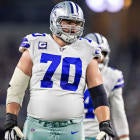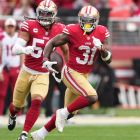It's safe to say that not many people expected the Tennessee Titans to be playing football this weekend. Tennessee was a nine-point underdog in its Wild-Card round playoff game against the Kansas City Chiefs, and when the Titans fell down 21-3 late in the second quarter, it sure looked like their season was over.
Of course, we know that's not how things went down. Marcus Mariota and company staged one of the best playoff comebacks we've seen over the last several years, outscoring Kansas City 19-0 in the second half and coming up with a huge defensive stop with just over two minutes remaining in the game.
Their reward for such a hard-fought victory is a date with the No. 1 seeded New England Patriots -- a game in which they are even bigger underdogs. New England is favored by 13.5 points as of this writing, and is almost unanimously expected to advance to the next round.
Can the Titans pull off another shocking upset? We'll find out on Saturday night.
How to Watch
Who: Titans vs. Patriots
Where: Gillette Stadium, Foxborough
When: Saturday, Jan. 13, 8:15 p.m. ET
TV: CBS
Streaming: CBS All Access
Versatility is the key to Patriots offense
There is maybe no player that more exemplifies what makes the New England Patriots offense so tough to stop than Dion Lewis.
During his breakout 2015 season, Lewis operated primarily as the Patriots' pass-catching back before he went down with a torn ACL. In seven games and six starts, Lewis carried 49 times for 234 yards and two touchdowns, and caught 36 passes for 388 yards and two additional scores. According to Pro Football Focus, New England called a run play on just 16.9 percent of Lewis' snaps; the Patriots called a pass on 67.9 percent of his snaps.
Two years and a full recovery from surgery later, Lewis emerged as the Patriots' power running back despite standing just 5-foot-8 and weighing only 195 pounds. Mike Gillislee held that role at the start of the season, logging double-digit carries in each of the first five games of the year while Lewis had a high of seven, but as Gillislee became increasingly ineffective, the Pats moved Lewis into the bigger back's role.
And from there, Lewis just kept taking over a larger and larger share of the offense, until he basically became a workhorse feature back over the final two weeks of the season. (Injuries to Rex Burkhead and James White played a role in that ascension, but Lewis had become the Patriots' most effective back by then.) Lewis ran the ball 50 times in Week 16 and 17 combined -- the greatest number of carries he had in a two-game stretch prior to Week 16 of this season was 30, and it happened in Weeks 11 and 12.
Two years after being almost strictly a pass-catching back that worked as an occasional change-of-pace runner, Lewis had the kind of run-pass split you might expect to see from a much larger player.
| YEAR | RUN | PASS | BLOCK |
| 2015 | 16.9 | 67.9 | 7.3 |
| 2017 | 45.6 | 40.9 | 3.9 |
It's that kind of versatility that makes Lewis such a good player, and so perfectly exemplifies what makes the Patriots so tough to stop. Everyone on their offense can play multiple roles.
Rob Gronkowski is the best blocking tight end in the league and one of the best pass-catching in-line tight ends in NFL history, but he's even tougher to stop when the Patriots split home out wide near the goal line and let him isolate one-on-one. Brandin Cooks and Chris Hogan are both equally effective when lined up out wide or in the slot. (Hogan is expected to return this weekend after a lengthy absence due to a shoulder injury.) Rex Burkhead exhibits similar versatility to Lewis, as he's able to both run between the tackles and line up out wide like a wide receiver and run every route in the tree. James White is a great pass-catcher and when given the opportunity to run the ball, has proven surprisingly effective.
Finding players that can fill multiple roles is how the Pats manage to generate a mismatch on almost every snap. And they have a quarterback that is better at identifying pre-snap mismatches than any quarterback that has ever played football. Tom Brady gets the ball out quicker than almost any QB in the league, and while he has a quick release, the reason he is able to get the ball out as quickly as he does is because he almost always knows where he's going with the ball before he receives the snap.
This, of course, is all bad news for the Tennessee Titans. Tennessee had a strong run defense this season (seventh in rush defense DVOA, per Football Outsiders), but a porous pass defense (24th). They were most vulnerable against tight ends (Gronk), running backs (Lewis, White, Burkhead), and short passes (32nd), all of which plays right into New England's hands.
For the Titans, the run game is the key
When you're a heavy underdog, most of the time the best course of action is employing what some call "David strategies." In case you don't get the reference, it of course refers to the story of David, who defeated the Biblical warrior Goliath of Gath in single combat. There's a reason lopsided battles are often referred to as "David vs. Goliath" matchups, and that's it.
The Titans are obviously the David in this scenario, and the No. 1 seeded Patriots are Goliath. But the recommendation here is that the Titans should go against the grain and not employ David strategies against New England. (David strategies in football generally tend to be taking a lot of chances, throwing deep downfield in an attempt to create big plays, etc.) Instead, the Titans should lean on their greatest strength -- because it happens to match up with the Patriots' greatest weakness.
The base of the Titans' offense is their running back. DeMarco Murray and Derrick Henry were far less effective this season than they were a year ago when the Titans had one of the best rushing attacks in football, but Marcus Mariota's regression stifled the team's pass offense. The Titans ranked eighth in rushing DVOA this season, per Football Outsiders, and 20th with the pass.
Luckily for them, the Patriots had one of the NFL's worst rushing defense -- 30th in the league, per DVOA. The Pats allowed at least 100 rushing yards in 10 of their 16 games this season, including each of their three losses. In each of those three games, New England's opponent not only ran the ball effectively, but in doing so, was able to control the clock and keep the explosive New England offense off the field.
Because of the way New England is set up for success against the Tennessee defense, the Titans' best bet is not to try to create big plays out of thin air, but instead to grind the game down as slow as possible limit the number of plays both teams run, and hope that their strength-vs-weakness matchup can carry them to an improbable upset.
Who ya got?
The Titans shocked a lot of people when they beat the Chiefs last week. There will be no such shock this weekend. If the Patriots stake themselves to a big early lead, they're extraordinarily unlikely to allow a similar comeback. And considering the Titans' defensive weaknesses (their porous pass defense is most vulnerable to throws to tight ends and running backs), it sure seems like the Pats should be able to find plenty of offensive success.
By Saturday night, one half of the AFC title game everybody wants to see will be set. The Patriots advance in the rout everyone thought the Titans would be subjected to a week ago.
Our prediction: Patriots 31, Titans 13


















